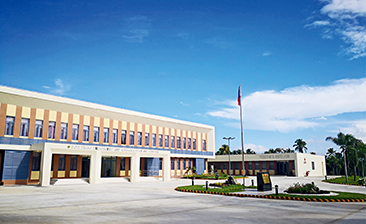Coconut trees sway in the warm ocean breeze shooting along a stunning stretch of mountains that add peace and tranquility to an array of spacious white courtyard buildings. Equipped with intelligent information systems ensuring security and facilitating wireless intercommunication, the three-hectare facility is a drug treatment and rehabilitation center in Agusan del Sur province in the southern Philippines, also known to locals as the “Window of Hope.” The facility was built with help from China.
Officially unveiled and handed to the Department of Health (DOH) of the Philippines on April 8, 2019, it was the second Philippine drug rehab center to be built with assistance from the Chinese government, following Soccsksargen Drug Abuse Treatment and Rehabilitation Center in Sarangani province, completed in 2018. Both are fruits of an agreement between the Chinese and Philippine governments on China-assisted drug rehab projects in the Philippines inked during President Rodrigo Duterte’s first state visit to China in October 2016.
‘Thank You, Our Chinese Friends’
“The Philippine Department of Health aspires to help more drug users access treatment,” proclaimed DOH Assistant Secretary Dr. Abdullah Dumama. “These two projects provide tremendous support for the Philippines’ anti-drug campaign. Thank you, our Chinese friends.” The well-equipped, cozy establishments help every rehab patient feel at home.
The 150-bed rehab center in Agusan del Sur province is one of the most modern such facilities in the Philippines. It includes an administration and admission building, dormitories, a visitor’s pavilion, covered court and other buildings. Its pleasant, comfortable surroundings and efficient operations meet the province’s dire need for a modern rehab center.
“The dream has become reality,” declared Governor Adolph Edward Plaza. “It took the will of the people of China and the Philippines to achieve this.”
“Many of my neighbors participated in the construction of the center, and we witnessed it sprout from the ground,” remarked a young villager living near the rehab center at the ceremony. “China funded this project, and Chinese companies offered us jobs and taught us skills. I have every reason to be excited about its completion.” The project contractor, China State Construction Engineering Corporation, reported providing technical training for 450 Filipino workers and introducing a wealth of job opportunities for local villagers.
The two projects are expected to save many lives in the Philippines and restore the productive livelihood of many people, according to DOH Undersecretary Roger Tong An. Tong An considers the rehab centers just one piece of the many fruits harvested through anti-drug cooperation between the two countries.
Cross-border Operations
Drug addiction is a hinderance to social development and a daunting challenge facing countries around the globe. Driven by money, drug cartels have endless resources to produce and smuggle narcotics that threaten social stability. Since taking office, President Duterte’s administration has introduced overwhelming efforts to crack down on drug crimes and embraced intergovernmental cooperation with China on drug control to create a sound and peaceful living environment for peoples living throughout the region.
Bilateral drug control cooperation has produced encouraging results in recent years. In October 2016, Chinese President Xi Jinping and Philippine President Duterte witnessed signing of Protocol on Cooperation between the Narcotics Control Bureau of the Ministry of Public Security of China and the Drug Enforcement Agency (PDEA) of the Philippines. An annual meeting mechanism was set up, and drug control agencies in both countries have since maintained close communication to facilitate cooperation, joint operations and intelligence sharing.
“Our re-energized relations with China have led to unprecedented cooperation between our nations on the war against transnational crime,” noted Duterte in his State of the Nation address on July 23, 2018. “Our shared intelligence led to the discovery and dismantling of clandestine shabu laboratories and the arrest of Chinese chemists connected to the Dragon Wu Syndicate organization.”
In September 2017, China’s Fujian Provincial Drug Law Enforcement Agency detected evidence that a ranking member of the Dragon Wu Syndicate, an international drug ring, was planning to use Chinese workers in its drug factories in the Philippines. Fujian officials immediately informed their Philippine counterparts, and a joint task force was quickly formed.
Shen Yue, deputy director of the Operations Division of the Narcotics Control Bureau of China’s Ministry of Public Security, joined the task force and flew to the Philippines to participate in joint enforcement operation. After seven months of investigation, the task force located the drug factories in Batangas province. Early on the morning of April 12, 2018, a raid was launched, and four drug factories and warehouses were destroyed. A total of 4.6 tons of liquid amphetamines, 481 grams of crystal meth and 13 tons of raw materials and processing tools were seized, and 12 suspects were arrested. In China, Fujian police simultaneously raided the group’s facilities and arrested four suspected drug traffickers. Shen Yue attributed the success of the joint strike to principles of “respecting differences, appropriate flexibility and win-win cooperation.”
Since 2016, joint operations conducted by the two countries have busted numerous transnational drug rings.
Closer Partners
To implement consensus reached by both countries as part of the Protocol on Cooperation, China and the Philippines have intensified institutional exchange and training as well. Since 2017, the two countries have organized three meetings on anti-drug cooperation at which representatives exchanged intelligence, delivered crime updates, discussed mutual trafficking cases, shared real-time information and analyzed reducing demand. Cooperation plans were rolled out, and a series of consensus documents were published.
Since 2016, China’s Ministry of Public Security has organized six drug enforcement training programs for Philippines drug enforcement agencies. China’s National Narcotics Laboratory organized a drug testing training session for Philippine officials, and PDEA Director General Aaron Aquino headed a delegation that visited China to attend a high-level seminar on drug control.
At the closing ceremony of a drug enforcement training course organized by China, a representative of Philippine trainees expressed appreciation for the abundant information from lecturers as well as the familial comfort. “The end of this event is only the beginning of our efforts to curb drug crime,” he added. “We believe that more and more warriors will join the fight against drug smuggling and that Chinese and Filipino officials will continue to collaborate and become even closer colleagues.”

Locally known as the “Window of Hope,” the China-funded drug treatment and rehabilitation center in Agusan del Sur province in the southern Philippines adopts a modern design.

Governor Adolph Edward Plaza (second left) of Agusan del Sur province receives a symbolic key to the rehab center from Jin Yuan (second right), Economic and Commercial Counsellor of the Chinese Embassy in the Philippines.


 Copy Reference
Copy Reference